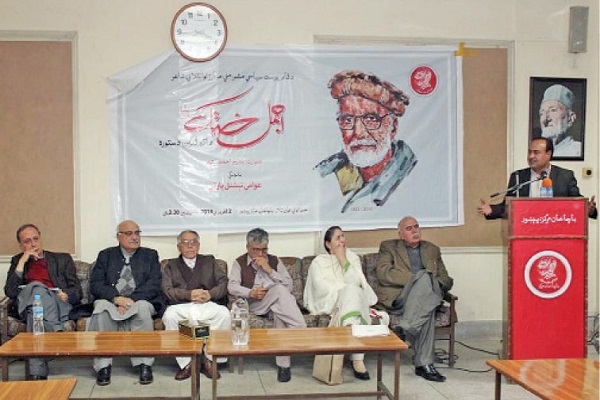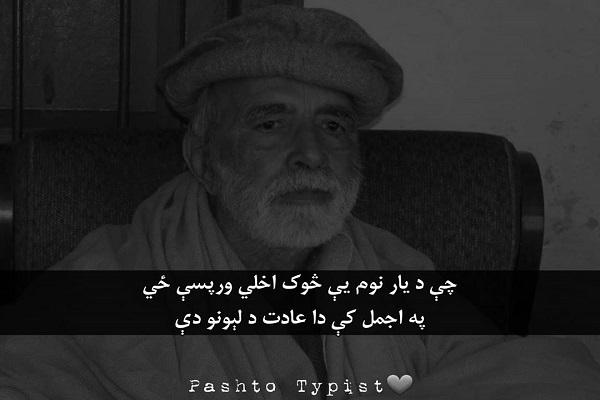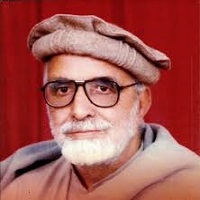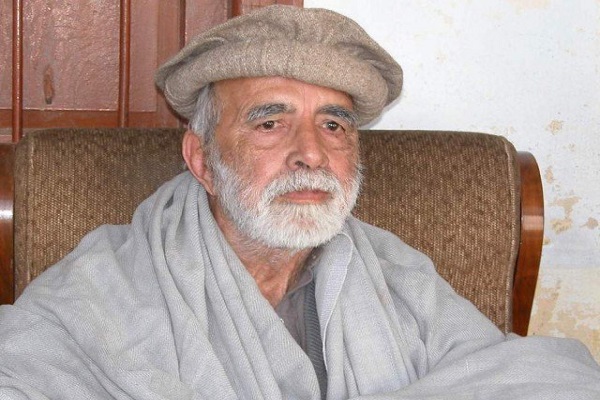Ajmal Khattak was a KPK based poet, writer, politician, Khudae Khidmatgar, ex-president of ANP (Awami National Party), and a close aide of Khan Wali Khan (Late). He participated in active protests and rallies against British Raj during his student life.
After Pakistan’s independence in 1947 Khattak joined NAP (National Awami Party) and made close ties with Abdul Wali Khan. He also served as Secretary-General of NAP from 1969-1973. Abdul Haq defeated him in general election 1970, and after a crackdown against the party by Zulfiqar Bhutto’s government, he departed into exile to Afghanistan’s capital Kabul.
He came back in 1989 and got elected to Pakistan National Assembly in 1990 and was designated as President of ANP after Wali khan’s retirement. The article has every detail about him, including Ajmal Khattak Biography.
| Title | Description |
|---|---|
| Personal | |
| Name: | Ajmal Khattak |
| In Urdu: | اجمل خٹک |
| Famous As: | Pashtun Poet |
| Nationality: | Pakistani |
| Education: | Masters in Persian from Peshawar University |
| Religion: | Islam |
| Profession: | Politician, Writer and Poet |
| Born | |
| Date: | 15th September 1925 |
| Place: | Akora Khattak, Khyber-Pakhtunkhwa, India |
| Died | |
| Date: | 7th February 2010 |
| Rest Place: | Peshawar Khyber-Pakhtunkhwa Pakistan |
| Career | |
| Political Party: | Awami National Party |
| In-Office | |
| Role: | President Awami National Party |
| Dates: | 1991–1999 |
| Preceded By: | Wali Khan |
| Succeeded By: | Asfandyar Wali |
Table of Contents
Ajmal Khattak Biography
Ajmal was a veteran poet and politician and had an extremely versatile and active literary career; he served as Editor-in-Chief of several periodicals and newspapers. He also authored over dozen books in English, Urdu, and Pushto.
During Zia-ul-Haq and Pakistan’s covert war against Soviet-Afghan rule in Afghanistan, he remained expatriated from 1973 to 1989. He never compromised on his principles and raised his voice for society’s marginalized and oppressed segments.
Khattak fought against martial law and struggled to achieve the rights of his country fellows. He was a forceful voice of poor individuals whose poetry melted ruling elites’ hearts. Ajmal Khattak set new trends in political vision and Pashto poetry. He quit politics many years before his death.
Ajmal Date of Birth
He opened his eyes on 15th September 1925 in Arora Khattak, KPK, Pakistan.
Education of Ajmal
During his childhood, he was immensely influenced by Abdul Ghaffar Khan famous as Bacha Khan. At the age of seventeen, he was a dedicated member of August Movement. He attended Government High School in Peshawar but quit studies to play his part in this movement.
However, he returned to studies and completed a Masters degree in Persian from the University of Peshawar.

Career
Initial Political Career
Khattak’s initial political career started during August Movement after he was influenced by Khudae Khidmatgar movement. He was compelled to quit school and studies due to his August Movement/Quit India Movement participation.
He served as an editor of several periodicals and Newspapers including Anjum Shehbaz, Adal & Rahber and as script-writer for Pakistan Radio.
Efforts for Persian Literature
At ICP (Islamia College Peshawar) he was among those pioneers who kept Pushto literature on modern-track. He linked it to the literature of Europe, especially English and became able to give it a new direction. He got recognition as a progressive poet.
Participation in August Movement
He had an extensive career in both Indian Independence-Movement against Government of British in KPK, British India then and a member of NAP (National Awami Party) in its several incarnations in Pakistan.
1970 Elections
He got defeated in elections of 1970 in his native constituency when KPK cabinet resigned in a protest at Baluchistan Government’s dismissal headed by Sardar Ataullah Mengal, Khattak became NAP’s Secretary-General.
Services for UDF
He worked as stage-secretary and organizer at UDF (United Democratic-Front) Rally held on 23rd March 1973 at Rawalpindi’s Liaquat Bagh, when firing was opened at leaders of UDF including Khan Abdul. Many NAP and UDF workers were killed to stop the rally by authorities.
Exile
As a leading figure in NAP, Federal Security Force (FSF) wanted him as part of a crackdown on National Awami Party. To escape from possible torture and arrest, he departed into exile to Afghanistan and remained there for sixteen years. During his stay there he remained associated with Pashtunistan movement.
During his time in Kabul, he remained a close aide of Bacha Khan and enjoyed great terms with leaders of PDPA (People’s Democratic Party of Afghanistan) including Dr Muhammad Najibullah, Babrak Kamal, and President Nur Mohammad Taraki.
Poetry and Writing
He authored several books in Pashto language and wrote thirteen books in Urdu and Pushto including ‘Da Wakht Chaga.’ ‘Pukhtana Shora,’ ‘Jalawattan Ke Shairi,’ ‘Guloona Auo Takalona,’ ‘Gul Auo Perhar,’ ‘Batoor,’ ‘Da Ghirat Chaga,’ ‘Pakistan Mein Qoumi Jamhori Tehrikin.’
The University of Pennsylvania’s Department of South-Asian studies recognized his work and translated it into English. In 2007 he received Kamal-e-Funn award by PAL (Pakistan Academy of Letters).

Moved Back to Pakistan
In 1989 he terminated his exile after ANP the NAP’s successor, became part of an association with Nawaz Shareef & his PML (Pakistan Muslim League)-led IJI (Islami Jamhori Ittihad). In general election 1990, he got elected from Nowshera to Pakistan National Assembly defeating PPP’s Tariq Khattak.
These elections indicated Khan Wali Khan’s retirement after his electoral defeat to Maulana Hasan Jan of JUI (Jamiat Ulema-e-Islam). Khattak got elected as ANP’s President when Khan Wali stepped down from his post.
ANP’s President
In general elections 1993, he lost in a re-election bid in his home town Nowshera to Major Gen Naseer-Ullah Babar, a PPP candidate. As PPP’s leading critic it was imperative for IJI-ANP alliance to include Khattak in the Parliament and therefore he got nominated to Pakistan Senate in March 1994.
Allegations of Ties with Musharraf
He was removed from ANP’s presidential post in 2000 after a power struggle with Khan Abdul Wali’s wife Naseem Wali, prompted by allegations of his close ties with Pervaiz Musharraf.
Led NAP
After he decided to leave the party, he headed a splinter group ‘National Awami Party’ of Pakistan for a brief period. His party was defeated in general elections 2002 amidst political-religious parties association MMA (Muttahida Majlis-e-Amal) KPK’s sweep.
After MMA’s shook victory, he again joined ANP after efforts of Khan Wali. In 2003 he retired from politics and got the title of party patron-in-chief. Khattak’s two terms as ANP President were observed mainly for association with ex-antagonists. After association, the Muslim-League disintegrated in Jan 1998 over renaming NWFP to Khyber Pakhtunkhwa and his role in heading ANP shortly into joining PONM (Pakistan Oppressed Nations Movement).
Ajmal Khattak Death
He passed away at the age of 85 on 7th Feb 2010 at a Peshawar’s local hospital. He left politics many years before his death and was living at his ancestral village Akora Khattak. Some unknown militants have blown up its shrine on 12th May 2012.

